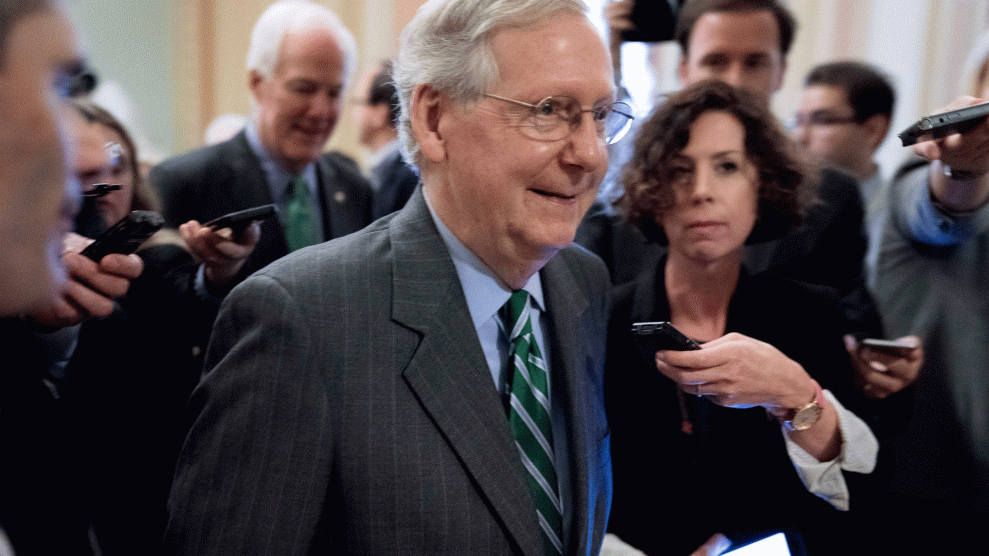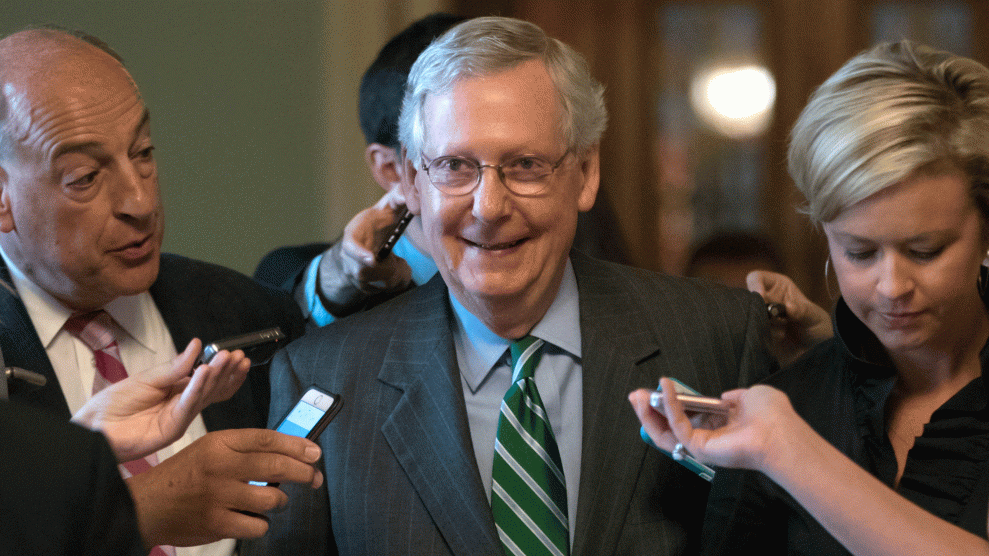
Senate Majority leader Mitch McConnell after announcing the release of the Republicans' healthcare billAndrew Harnik/AP
After he canceled a planned vote earlier this week, Senate Majority Leader Mitch McConnell (R-Ky.) is scrambling to find proposals that he can tack onto his health care bill in order to win over the Republican senators who are opposed to the legislation to repeal and replace Obamacare. One of his first moves: reportedly adding in $45 billion to address the opioid crisis over the next ten years. That addition was aimed at Ohio’s Rob Portman and West Virginia’s Shelley Moore Capito, both moderate Republicans representing states hard hit by the opioid epidemic. Both senators said they wouldn’t vote for the original version of the Better Care Reconciliation Act, which relegated just $2 billion for use in 2018—with no money allocated for future years.
But drug policy experts, including some within the administration, critiqued that $45 billion figure as a paltry attempt to appease the senators in the context of cutting off coverage for millions of poor Americans. “All this package does is allows for additional [substance use] treatment, then forces our providers to send their patients off to die in a corner of another deadly ailment,” said substance abuse policy consultant Andrew Kessler of Slingshot Solutions.
Critics worry that opioid addiction treatment funding wouldn’t be effective in the absence of other health care coverage. The Senate bill would reduce Medicaid spending by $772 billion and leave 22 million more people without insurance over the next decade, according to an analysis by the Congressional Budget Office. While the additional $45 billion could increase access to treatment, opioid addiction rarely is a user’s only diagnosis: it’s often accompanied by a host of other illnesses, including hepatitis C, HIV, and depression. The typical Medicaid recipient with opioid use disorder costs between $11,000 and $12,000 per year. It would cost roughly $183 billion over ten years to cover the cost of opioid addiction treatment and the illnesses that frequently come along with it for those who would lose coverage if Obamacare is repealed, according to estimates by Richard Frank, a professor of health economics at Harvard.
McConnell’s attempt to sweeten the deal hasn’t seemed to pay off. Both Portman and Capito have indicated that they’re still not ready to vote for the bill, according to Politico. “I’m not there yet,” said Capito, who is calling for more Medicaid funding. Portman called the funding “progress,” but said he still had other concerns.
The Senate bill would also give states the option to opt out of “essential health benefits,” a component of Obamacare that requires insurance companies to cover certain (often expensive) benefits like emergency services, contraception, and substance abuse treatment. Waiving the essential benefits requirement would “leave a lot of places to drop substance abuse coverage because it’s cheaper if you don’t take care of peoples’ addiction,” said Keith Humphreys, a Stanford University psychiatry professor who advised the Obama administration on drug policy.
“At a time when we are moving toward integration and care coordination, this approach moves us backward toward separate and unequal treatment systems for addiction and all other medical care,” said Dr. Kelly Clark, president of the American Society of Addiction Medicine, in a statement responding to the $45 billion proposal. Ohio’s Republican Gov. John Kasich has said separate opioid funding without additional health coverage was “like spitting in an ocean.”
Multiple drug policy experts in the federal government expressed skepticism, too. $45 billion is “a drop in the bucket compared to the cuts,” said one executive branch official, who spoke on the condition of anonymity. “It’s kind of like a ‘Look over here while we take away your healthcare coverage!'”












